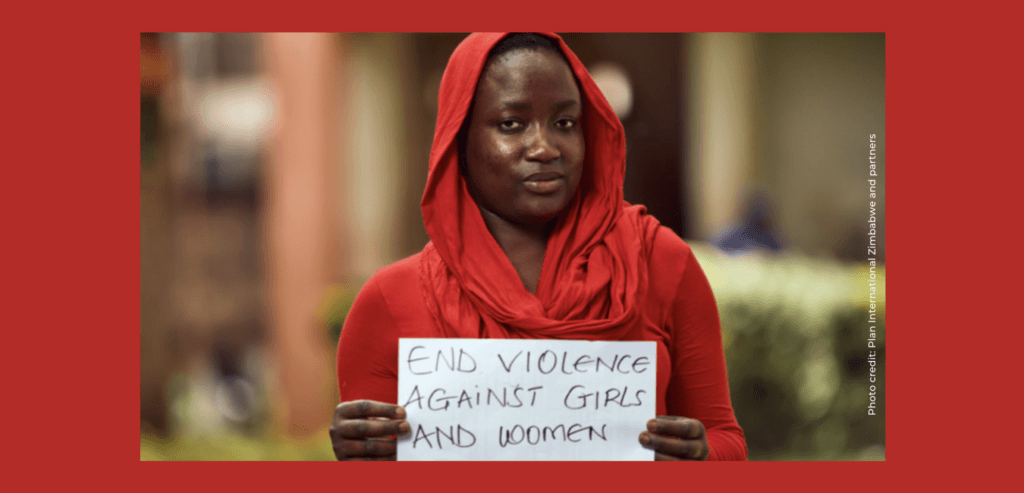It is women and girls who experience the brunt of gender-based violence, or GBV. These experiences can be more prevalent and intensified in cities.
By 2050, 68% of the world’s population will live in cities, while by 2030, 60% of the world’s urban population will be under the age of 18. This presents specific challenges for how to keep women and girls safe in urban environments. As part of 16 Days of Activism Against Gender-Based Violence, we offer 16 ways of building safe and inclusive cities based on insights from our work in cities through the Safe and Inclusive Cities (SAIC) programme.
The programme has been implemented across four countries in East and Southern Africa: Uganda, Kenya, Zimbabwe and Ethiopia. Within each country, Plan International and partners have helped to tackle the diverse forms of violence that happen in cities by increasing the knowledge and skill base of young people. The programme increased awareness among young people of their rights and the different forms of violence in cities, including GBV. The programme also increased the knowledge of young people in relation to employment and self-employment, and built civic participation skills. This helped young people gain decent employment and reduced their potential exposure to criminal activity and violence. By strengthening communication skills and creating fora for open dialogue, youth are also empowered to interact with city governance stakeholders and actively take part in local-level decision-making, directly influencing the safety of the urban spaces they live in.
Here are 16 ways in which civil society organisations, as well as local government and law enforcement agencies can support young people living in cities in the fight against GBV:

Plan International Zimbabwe and partners
Increase safety in communities and public transportation
- Increase the awareness of children and young people related to their rights, and to systems and mechanisms for reporting violations. Being aware of your right to safety empowers and increases likelihood of reporting violence.
- Build the capacity of youth-led organisations to work on urban safety. For example, assist and/or enable youth-led organisations to carry out dialogues with community members and former perpetrators of gender-based violence.
- Map out areas that are unsafe for children and youth, and especially girls, within communities, highlighting risk areas. Understand what makes spaces unsafe and invest in the implementation of immediate solutions, such as improving lighting.
- Embed conversations on violence and safety in routine cultural activities and make the wider community aware of spaces that are perceived to be unsafe. Cities are known to have few suitable areas for safe play, and crowded places and transport can often be unsafe for young girls. Promote positive values in conversation with communities, emphasising that tackling violence is beneficial to all age groups.
- Make transport authorities aware of the safety needs of youth and young girls. Speak to drivers, conductors, and other transport wardens about how to ensure a protective transport environment.
- Identify gender champions and mobilise civil society around gender sensitivity to promote safety with public transport staff.

Plan International Uganda. Girl speaking to transport drivers in one of the informal settlements as part of the project
Decent work opportunities and youth economic empowerment
7. Engage youth in economically productive activities, specifically building their skills to seek and gain employment and/or become self-employed. This includes sharing knowledge on how to open and manage businesses and apply for funding. By creating safe, decent, and fair workplaces for young people and girls, they are less likely to resort to criminal and unsafe practices to secure their livelihoods. Decent and fair workplaces also help foster personal and community wellbeing, thus reducing the likelihood of interpersonal violence.
8. Train young girls and women in vocational and business skills, raising aspirations for their economic activities. This reduces young women’s reliance on sex work and limits their exposure to violence.
9. For those working in informal sectors, offer advice on what constitutes safe and decent work and workplaces, reminding youth of their work-related rights, and how to apply them.
10. Where possible, directly assist youth in securing financing opportunities.
11. Form and mobilise youth specific savings groups, enabling them to support young women and men in opening their own business or leaving unsafe workplaces.
12. Where possible, broker access to existing micro-finance institutions or create new ones, to enable young people to access, loans that can strengthen their business and livelihood.

Plan International Zimbabwe and partners
Youth governance and active participation
13. Work with city authorities, including local governments and law enforcement to identify strategies for tackling GBV, harassment and abuse of girls and women on public transport. Communicate clearly to youth what they can expect from authorities and how to hold them accountable.
14. Enable youth to come together and conduct accountability audits in their local areas. This is critical in creating an informed base for civic participation, especially in informal settlements.
15. Invest in sharing knowledge and skills for civic participation. Particularly work with youth around productive dialogues and budgeting processes so that youth can work with government authorities to tackle GBV and develop their community.
16. Bolster the capacity of civil society and community organisations in relation to the rights, laws and policies applying to urban programming for youth and girls. For example, mentor organisations in how to conduct participatory urban assessments, social audits such as scorecards, and foster diplomacy and dialogue skills.
For more information about the SAIC programme, accounts from participants and key outcomes click here
Nete Sloth Hansen-Nord is Programme Manager at Plan International Denmark. She is responsible for the Research and Documentation component of the Safe and Inclusive Cities programme. nete.hansennord@planbornefonden.dk
Karin Diaconu is Urban Research Manager at Plan International Global Hub. She is engaged in research on the Safe and Inclusive Cities programme. karin.diaconu@plan-international.org
This work is licensed under a Creative Commons Attribution-NonCommercial-NoDerivatives 4.0 International License.

